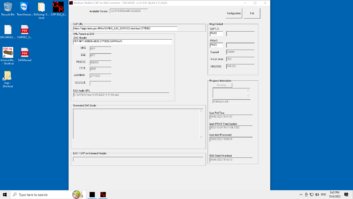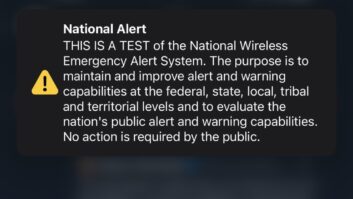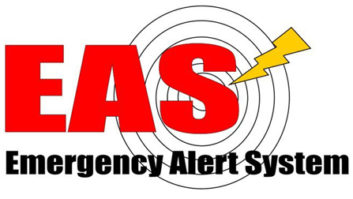Stations, engineers and government emergency personnel are working out the practicalities of the migration to advanced EAS. Specifically, the June 30 deadline is approaching for broadcasters to have Common Alerting Protocol-compliant EAS gear installed and in working order at their stations.
Edward Czarnecki is senior director for strategy, development & regulatory affairs for Monroe Electronics. He also co-chairs “working group 9” of the FCC’s Communications, Security, Reliability and Interoperability Council, along with Chris Homer of DirecTV. He says that says that by June 30, the commission will expect all broadcasters to have certified CAP EAS equipment in place, connected to the Internet, and polling the IPAWS aggregator.
Radio World News Editor/Washington Bureau Chief Leslie Stimson asked Czarnecki questions via email about several of the changes occurring that affect broadcasters regarding EAS.
RW: Recently we talked about the efforts by the FCC Common Alerting Protocol working group of the Communications, Security, Reliability and Interoperability Council to urge the commission to rethink its “text-to-speech” ban. What else is your working group focusing on for EAS and why?
Czarnecki: In addition to looking at challenges presented by the text-to-speech prohibition, the FCC CSRIC working group on CAP EAS migration also examined the FCC’s new streamlined certification process for CAP EAS equipment. The commission is attempting a generally well-considered and balanced approach to the critical need to have CAP EAS equipment properly certified by the June 30 CAP compliance date.
We found that most equipment types had a good probability of meeting the streamlined certification guidelines, as long as they had a valid IPAWS CAP conformity test result, which applies to a specific hardware and software version that was tested. Devices that do not have a test report or “Suppliers Declaration of Conformity” that covers the equipment configuration as actually tested may have a challenge in meeting the certification requirements by June 30.
For our part, the Digital Alert Systems’ DASDEC, as an integrated CAP EAS device, will have to file a “Class II permissive change” request with the FCC, together with a copy of our existing Suppliers Declaration of Conformity. We’ll likely do that immediately upon the rules becoming a matter of law on April 23.
Other configurations of equipment — intermediary devices — will need to be FCC Part 11 certified by June 30, which will require a degree of testing. And those devices that have neither a relevant Suppliers Declaration of Conformity nor a Part 11 certification will have some challenges frankly.
The working group looked at potential issues that could arise by combining IPAWS Conformity Assessment with FCC Part 11 Equipment Certification. Among other issues, we noted that the FEMA CAP conformity test guidance, needed for test facilities to review and design of their test support programs, has not yet been publicly posted. However, there was broad consensus among working group members that nothing we examined would warrant any extension to the 30 June 2012 CAP compliance deadline
RW: Did the working group have any specific recommendations on EAS CAP equipment certification?
Czarnecki: The working group had a number of specific recommendations for the FCC’s streamlined certification process, including recommending that the FCC require submission of both a vendor supplied “Suppliers Declaration of Conformity” as well as the actual third-party CAP Conformance Test Report. All those manufacturers that went through the original IPAWS CAP testing have such a report, which can be found at www.rkb.us.
The working group recommended that all CAP testing be conducted via FCC-approved third-party facilities, and that that any self-certification be disallowed as being inconsistent with the existing regulations and established procedures. We also cautioned that the FCC should ensure that equipment certifications relate to the specific product combination (hardware model + software version) that was actually originally tested under CAP and Part 11.
The FCC clearly was taking a “caveat emptor” approach in its Fifth Report and Order, and broadcasters might be well served to be an informed customer and inquire of their vendors exactly what approach they will be taking to meet the CAP equipment certification requirement. The working group will continue looking at EAS CAP issues, and will have a follow up report in June 2012.
RW: What should broadcasters expect to happen between now and June 30, as they prepare for the CAP compliance deadline?
Czarnecki: By June 30, the commission will expect all broadcasters to have certified CAP EAS equipment in place, connected to the Internet, and actively polling the IPAWS aggregator.
This means it does not look like the FCC will be reversing its position on prohibiting text-to-speech on EAS CAP equipment, at least not before the new rules become law on April 23. Broadcasters should confirm with their respective equipment vendors to ensure the text-to-speech capability is disabled on their equipment by then. Different vendors will have varying approaches to manage this.
For the Digital Alert Systems DASDEC, for instance, there is an existing menu option to simply deselect the text-to-speech option. If the FCC decides to reverse its position on text-to-speech, the DASDEC user can simply re-enable the capability.
Manufacturers of EAS CAP equipment should provide guidance to EAS participants, as soon as practical, as to how the text-to-speech option can be disabled on each respective version of equipment. This information is already in our product documentation, and we will be issuing an additional advisory in the near future.
RW: Could anything unexpected impact equipment manufacturers between now and June 30?
Czarnecki: A curious situation arises after the CAP EAS rules take effect after April 23. Once the 5th R&O formally takes effect as law, all vendors of CAP equipment without a prior Part 11 certification likely have to stop marketing and selling their equipment until they have their formal FCC certification. This is nothing new per se, since the “Part 2” rules (47 CFR 2) regulating certified equipment have been out there for many years — and all EAS manufacturers were subject to those prohibitions when we first came out with our equipment years ago.
Because most integrated CAP EAS equipment already have Part 11 certifications, the FCC determined that these devices can continue to be marketed — so long as they get their permissive change filings in by June 30. However, the FCC did not extend that to intermediary devices, meaning that it appears that any selling or marketing of those types of equipment may have to stop on April 23rd until they get Part 11 certified.
RW: We’re hearing some stations haven’t sent in their EAS test reports to the FCC and they might be fined. What have you heard about that?
Czarnecki: We have heard though several sources at different venues that the response rate to the national EAS test report filing requirement was as low as 60% of all EAS participants. That is a response rate that is likely unexpectedly low for the FCC, particularly since they had tried to make it clear that test reporting was mandatory. There was discussion at a recent cable television show of potential fines that would not be insignificant, and we have heard a figure of fines up to $5,000 from several other sources. We’re hoping for clarification from the FCC, but regardless, broadcasters were given a requirement to file a national EAS test report, whether on line or by paper. Reporting is not complicated, and really does need to be completed.
RW: Might the June 30 deadline be delayed again?
Czarnecki: At this time, we’re really not getting the sense that the FCC is interested in allowing the CAP deadline to be extended again. One can’t discount the possibility that the FCC could be presented with some extraordinary facts, however, every public and private statement I’ve heard from FCC staff at all levels is that they really mean for the June 30 deadline to remain in effect.
Most EAS participants have already acquired their CAP EAS equipment. Most have some form of broadband connectivity to reach the IPAWS server, and most vendors should be able to complete their device certification requirements by June 30. The FCC may consider waivers in the case of individual EAS participants with exceptional circumstances, such as the total physical unavailability of Internet connectivity to reach IPAWS. But, overall, the entire industry has been gearing up for the CAP EAS deadline for some time now, and at some point you have to say, “Let’s get on with it.”











